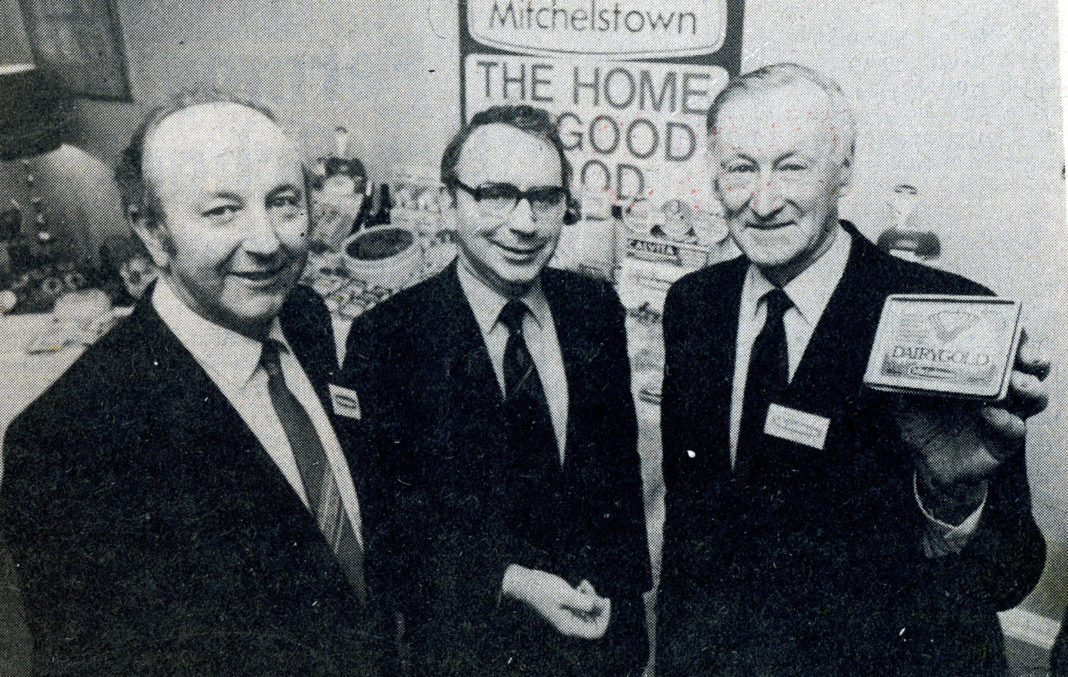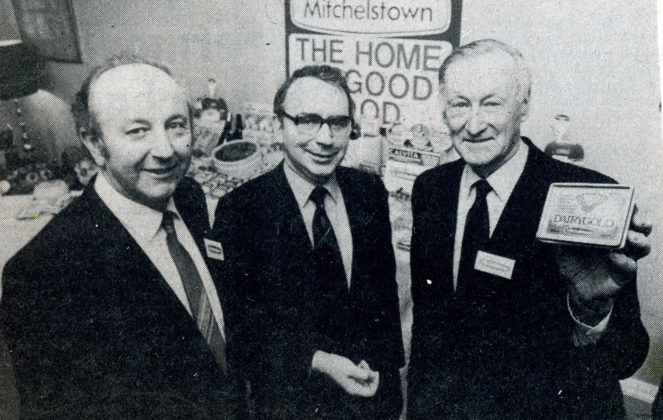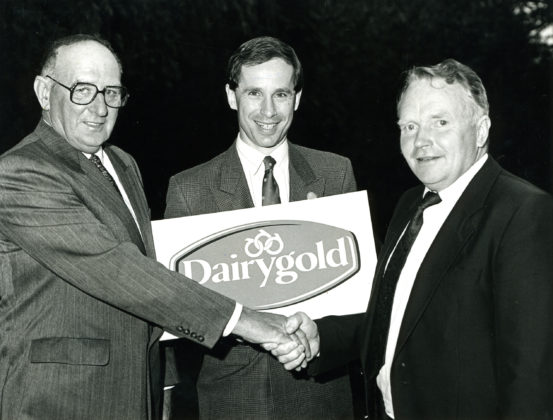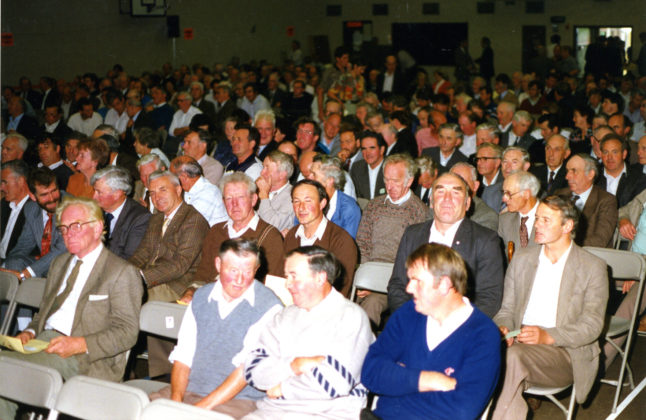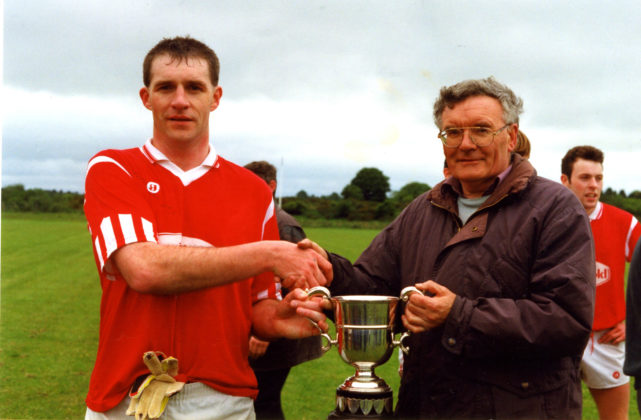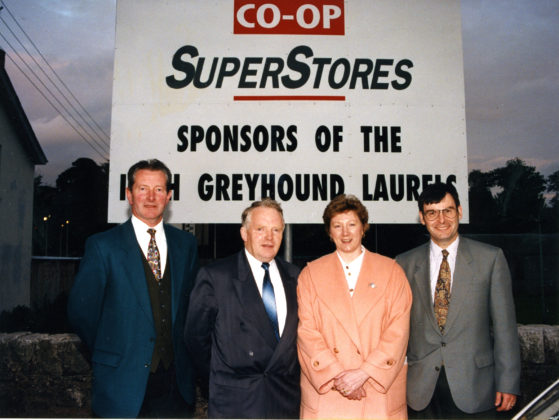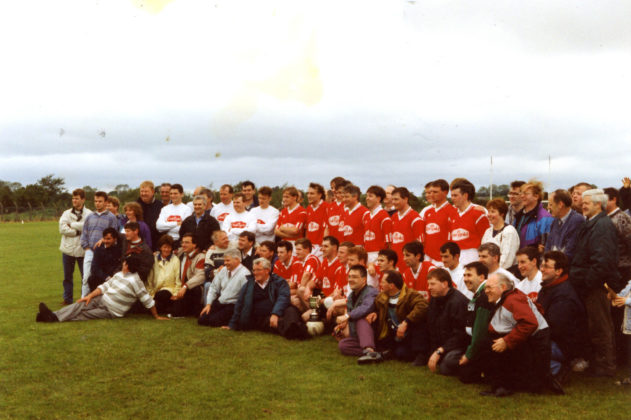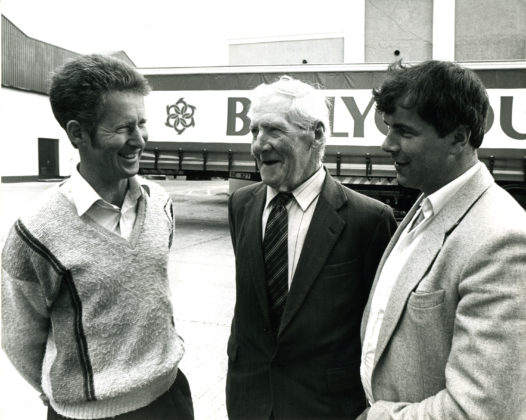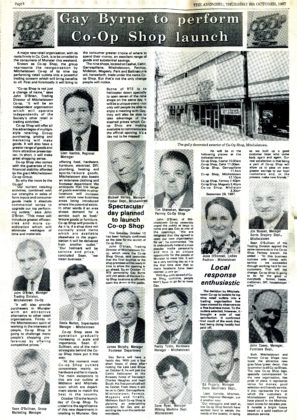Conceived and set up in 1919 in troubled times just after World War 1, the partition of the country, the War of Independence and the Civil War, Mitchelstown Co-Op and Dairygold as it is is today has initiated, overseen and spearheaded enormous changes in Mitchelstown and the wider Munster area in its 100 year history, with many, many locals helping it nurture and grow to the giant it is today.
There have been many ups and downs, good days and bad days in the long journey of Mitchelstown Co-Op and Dairygold Co-Operative Society, which in 2019 has a global reach with manufacturing facilities in Ireland and the United Kingdom, and sales offices across Europe and Asia, as their website tells us. In this article we will recall some of those times, salute and remember all who made it possible, many gone to their eternal reward. Ar dheis Dé go raibh a n-anamacha dilse.
Back then a group of local farmers, Con O’Brien, Roger Kiely, Joe O’Donoghue, PJ Luddy, James Quinlan and James Dwane, angered by the high prices being charged for farm supplies by local businesses, pooled their resources to purchase a quantity of grass and corn seeds directly from wholesalers. This challenge to the status quo of farmers being charged high prices by local shops, would have far reaching consequences.
It was not plain sailing by any means. The ICOS (Irish Co-operative Organisation Society) initiative met with stiff opposition from local businesses who were concerned about the impact which the co-op would have on local commerce.
Some businesses, supported by the clergy, vehemently opposed the setting up of the co-op and attempted to force local farmers to boycott the new business. In this, the banks also proved to be unwilling investors as they considered co-ops generally to be unreliable debtors.
On 14 May, 1919, at a shareholders meeting in the town, it was decided to form a co-operative store first and, if that proved successful, to set up a farmers’ creamery.
On June 25, the new society was legally registered at its office in New Square, now Farrell’s SuperValu and Post Office and opened for business on 12 November, 1919.
Early progress was slow. Accounts for the first seven months of trading showed a profit of just over £361. This was reinvested in the business, which gradually expanded both in terms of shareholding and in trading.
At a meeting on 26 August, 1920 a committee of management was elected under the chairmanship of Con O’Brien of Killicane. Others elected to the committee on that day were Roger Kiely, PJ Luddy, William Quinlan, Joe O’Donoghue, Ned Quane, Michael McGrath, Denis O’Brien, James Quinlan, Patrick Clifford, Dan Williams, Thomas McCarthy, Thomas Lyons, Michael Lewis and Mark Barrett.
SUCCESS
Over the next 20 years, one success followed another. In 1925, the creamery opened on Clonmel Road under the management of Eamon Roche, a native of Bruree, who was a former TD and lifelong friend of Eamon de Valera, whose son Kevin, the famed American-based architect, died just recently at the age of 96.
The creamery’s main product was ‘Galtee Butter’ and this was a vital element in Mitchelstown Creameries’ ability to pay a relatively high milk price. By May, 1928 Mitchelstown creamery had a peak average daily milk intake of 4,900 gallons.
Within a couple of years, it had expanded its network of creameries to include Curraghgorm, Ballindangan, Ballyhooly, Darragh, Glanworth, Knockadea, Ballyporeen, Araglin and Burncourt, thereby increasing its daily milk intake to 29,000 gallons.
Eamon Roche was the shining figure of Mitchelstown Co-op’s early evolution. He was a visionary of sorts, who frequently had to stand up to conservative elements with the committee of management.
In 1932, Roche won a licence from the Government to obtain the monopoly for the production and sale of processed cheese on the Irish market.
Its first cheese factory was established in old stableyards at Baldwin Street, behind the former Kingston Arms Hotel, which the co-op had purchased as offices.
It turned out three branded cheeses – Galtee, Whitethorn and Three Counties – all became household names. These were also sold, at a slightly later date, on the UK and American markets.
However, expansion brought its own problems. The 1930s was a decade of industrial disputes at the creamery, where workers continually complained of harsh working conditions and poor wage levels.
At one point, in 1935, Con O’Brien told the workers, in no uncertain terms, that the town owed everything to the co-op and anything which might be said or done against the Society would be regarded as ‘grave acts of disloyalty’.
Strikes followed, and on one occasion, young farmers broke a strike by entering the creamery to operate it in the absence of the employees.
The production of cheese also created environmental problems. Faced with whey as a useless by-product, farmers were encouraged to go into pig production (pigs fatten well on whey).
Consequently, pig production increased dramatically in the area so that, by the 1960s, the decision had been made to establish Galtee Foods for the processing of pork, another significant part of the operation.
UNCOMPETITIVE
Slaughtering in Mitchelstown ended in 2004 with the loss of 170 jobs, the company maintaining the sector had become uncompetitive. Galtee Meats closed finally in 2007, with the loss of the 70 remaining jobs there.
Breeo Foods, the consumer foods division of Reox Holdings, announced the move following an in-depth review of its manufacturing facilities.
Reox was the company formed as a result of the spin out of the non-farm dependent business activities from Dairygold Co-op in 2006.
Back in 1952, Mitchelstown Creameries lost its monopoly licence for the manufacture of process cheese. Faced with significant competition at a time when the hygiene and quality of its own cheese was brought into public question, Mitchelstown’s share of the Irish market declined rapidly. It was only in the 1960s that Mitchelstown cheese regained its place on shop and supermarket shelves.
Ireland’s accession to the EEC (now EU) in 1973, enabled virtually unlimited access to the lucrative dairy markets of the EEC as well as buoyant prices. Milk production in the Irish Republic doubled during the first decade of our membership.
Reflecting the drive towards rationalisation, 70% of the milk processing was carried out by only four major co-operatives, including Mitchelstown.
During the 1980s however, the surplus of dairy products within the EEC led to the imposition of physical quotas on the amount of milk produced, which were only removed recently.
Branded ‘The Home of Good Cheese’, the high quality and large variety of its natural cheeses which were extensively exported around Europe, earned many international prizes.
In 1968 the coveted Bord Bainne Cup for the best quality cheddar cheese in Ireland was won by Mitchelstown and was presented by Neil Blaney, then Minister for Agriculture to the Mitchelstown group of Paddy James (sales manager), Mick Roche and Molly Gallagher (cheese makers), Tom O’Keeffe (chairman), William D Hayes (asst general manager) and John McCarthy (general manager).
The cup was won on several occasions to the delight of all concerned.
NATURAL GAS
In 1986 Mitchelstown became the first co-op to install natural gas. Over the years there were many disputes and industrial relations were delicate, to say the least, at various times.
There were several strikes in these times as management and unions failed to see eye to eye on many issues, no different of course to other industries throughout the country, while in 1985, there was a no confidence vote by farmers concerned at the milk stop charges.
Co-Op Shops were officially launched in 1987 with TV personality Gay Byrne bringing the crowds out for another special milesone in the successful history of the group to New Square and over the years, many more branches opened throughout Munster, rebranded Co-Op SuperStores, including an upgrade of the Clonmel Road premises and the Fermoy store on Dublin Road.
The launch of the iconic Dairygold butter happened in February, 1985 and it continues to be a popular product on the shelves. The co-op’s first newsletter was published in 1992 and away from the bustle of indistry, on the sporting field, there were many successes, notably the inter-firm All-Ireland football title which was won by a strong Dairygold team in 1995.
At the time of the amalgamation with Ballyclough Co-Op and the birth of Dairygold in 1990, the annual sales of Mitchelstown and Ballyclough combined was £450 million, with £100 million net assets.
The 2018 results announced recently showed turnover up €27.4 million on 2017 figures to a record €992.9 million and the nett asset value of the business was €337.9 million.
Happy birthday Dairygold and thanks to all who played and continue to play a part in your success. Long may you continue to thrive and prosper as the journey, started all of 100 years ago, continues with great gusto.

